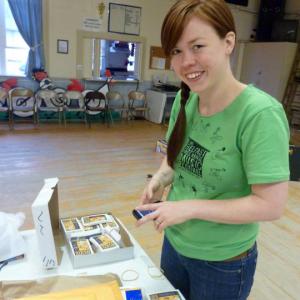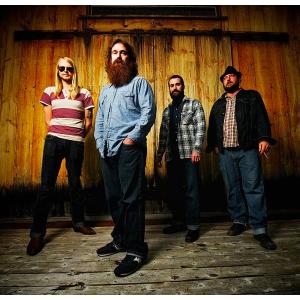Q&A: Meg Fournier, Belfast Free Range Music Festival
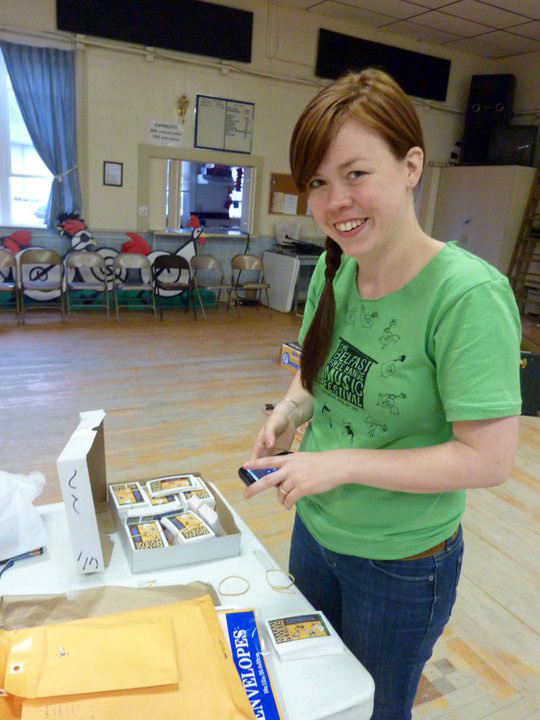 Belfast Free Range Music Festival organizer Meg Fournier working in the American Legion Hall before the event in 2011. (Photo by Kristen Burkholder)
Belfast Free Range Music Festival organizer Meg Fournier working in the American Legion Hall before the event in 2011. (Photo by Kristen Burkholder)
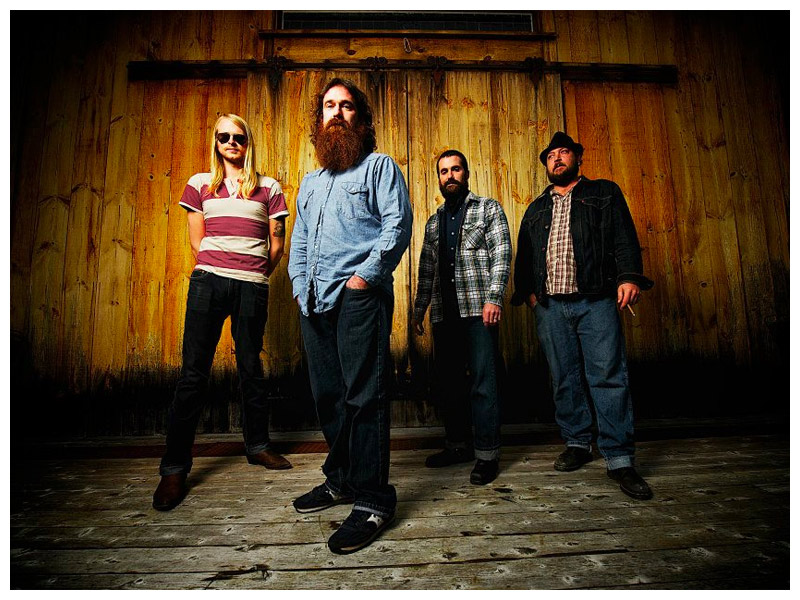 The band Waylon Speed, from Burlington, VT, recently performed at Unity College Centre for the Performing Arts, where Fournier is programming director. The band is also on the bill for the upcoming Belfast Free Range Music Festival.
The band Waylon Speed, from Burlington, VT, recently performed at Unity College Centre for the Performing Arts, where Fournier is programming director. The band is also on the bill for the upcoming Belfast Free Range Music Festival.
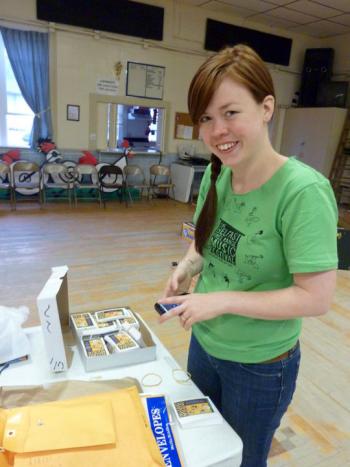 Belfast Free Range Music Festival organizer Meg Fournier working in the American Legion Hall before the event in 2011. (Photo by Kristen Burkholder)
Belfast Free Range Music Festival organizer Meg Fournier working in the American Legion Hall before the event in 2011. (Photo by Kristen Burkholder)
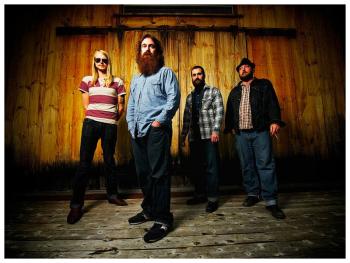 The band Waylon Speed, from Burlington, VT, recently performed at Unity College Centre for the Performing Arts, where Fournier is programming director. The band is also on the bill for the upcoming Belfast Free Range Music Festival.
The band Waylon Speed, from Burlington, VT, recently performed at Unity College Centre for the Performing Arts, where Fournier is programming director. The band is also on the bill for the upcoming Belfast Free Range Music Festival.
BELFAST - Organizers of the Belfast Free Range Music Festival on Friday began releasing the names of acts to perform at this year's installment of the day-long, multi-venue festival (disclosure: the writer is one of them).
The event, which takes place on April 27 with a kick-off party on the 26th, is in its fourth year and shows no signs of running out of steam, according to co-founder Meg Fournier, who said the real trick has been keeping the wildly popular show from growing too fast.
Fournier sat down with PenBay Pilot last week to talk about the history of the Free Range Festival, the upcoming event, and her day job as the programming director for Unity College Center of the Performing Arts.
The idea for the Belfast Free Range Music Festival came out of conversations among downtown business owners and musicians who saw it as a potential off-season attraction. At the time, Fournier and her husband Bub were running Roots and Tendrils, a performance space/arts and crafts boutique, out of a storefront on Lower Main Street. The venue has since closed but prior to the first Free Range Music Festival it was host to scores of local and touring musical acts, many of which ended up on early Free Range programs.
It was also through the club that Fournier met Jon Fishman — drummer for the band Phish and a resident of Lincolnville at the time — who lent his other band, Jazz Mandolin Project, to the bill for the first Free Range Festival. Fishman also enlisted fellow touring veteran Colonel Bruce Hampton, with Fishman playing drums for both acts. The name recognition was probably a blessing for ticket sales, but as Fournier recalls, the success of the festival never felt like a sure thing. And four years later, it still doesn't.
In hindsight, it seems like the festival was destined to succeed. But what was the first year like from an organizing perspective?
We didn't know what to expect. We started planning for it at the beginning of January. At some point, the week before the festival, something like 300 passes had sold and we were so relieved. We sold out on the morning of the festival and people kept coming to buy passes. It was like, OK, here we go. It was just such a blur that first festival day and there was this sense of euphoria, amazing things happening and wonderful performances. We decided to increase the capacity of the festival the second year and we were nervous about that. We increased our budget. But again the day of the festival came around and again it came off wonderfully. There's never been this sense that we're established. It's still surprising every year when the musicians sign up and people start buying passes. But, yeah, it seems like it's been a blink of an eye since that first year.
This year you did an Early Bird sale. Was that new?
Yes, It was a one week thing. We're doing a minimal pass increase this year of about $2 to $3, but we wanted to offer last year's prices for a week and it went well. We sold a good little chunk of passes. It's exciting to do that and see passes actually sell because we did this without releasing any of the line up. So it was really kind of like: how much do you guys trust us?
And they did.
And people bought passes so it's another big surprise for us. It's great, people are into it.
Are there any new venues this year?
No new venues, seven venues and the Friday night kick-off party, so eight total. That's our way of getting our toe wet.
Because you'd talked about having it go longer at some point.
We've thrown it out there, but the one-day Saturday festival has worked so well the past three years that we're worried about jeopardizing the feel of that burst of how much can you experience in one day? We feel like that's part of the uniqueness of the festival. It's also such a small group that pulls this off and it's all volunteer time, so the logistics of adding on another day just adds that much more work for us.
It is all volunteer still?
Yes, we have a volunteer crew and we still very much rely on the kindness of others to donate time and resources.
Maybe this is a loaded question but why wouldn't you pay yourself and a few of the core people?
We do give a small stipend. It's extremely minimal and in no way qualifies as paying ourselves. We pay the bands. That's been our real focus. [From the start] we were really adamant about establishing a base guarantee, and in our first year that was extremely minimal. So we've been working to increase that, but you start multiplying things by 33, which is what it's been the past two years, and you can start to see where the money goes. We're doing a small increase this year but we're still trying to keep the passes very affordable because we live in Waldo County and we want it to be accessible. Those have been our primary goals: to pay the musicians as much as we can, and keep pass prices low. It's a labor of love for all of us.
How many people are behind the scenes?
There are six of us that are the core crew: me, Bub, Dan Beckman is our booking coordinator, Kristen Burkholder, Nathan Raleigh, and Annadeene Fowler is back this year as our volunteer coordinator. Mike Hurley is still very much a part of it, and Al Crichton (of Waterfall Arts) is very helpful, so we also have our peripheral support team. And then there are the day-of volunteers and the volunteers leading up to the fest. We also have our volunteer tech crew, which is about seven or eight people, and also the NESCom [New England School of Communications] kids.
That's right, they do the sound at the American Legion Hall.
Yep. And they're actually doing another venue this year, too.
It's always fun to see them all crowded behind the board.
It's so much fun to be able to offer that at the festival as well; to have it be a learning experience also. It's really fun to see people experiencing the festival from a tech end. They've been such a funny crew, the students. They're so enthusiastic. Ed Goguen is the professor and it's great to see him directing these students and giving them this hands on experience. They get so excited and enthusiastic, especially if there's trouble with something. We've had students talking about trying to wire cables together and solder things.
The old Maskers Theater was one of the venues at one point. Was that last year?
The year before. Last year we started using Myn's on Market Street [a performance space in a house near the American Legion Hall].
Myn's? What does that mean?
I don't know.
Does anyone?
It was the name the owners of the space came up with.
Fournier said in the short history of the Belfast Free Range Festival visiting bands that might have only popped in for their own sets have started to stay in town for the whole day, seeing other acts and mingling with festival goers. The change has a lot to do with the vibe in Belfast, Fournier said, but the festival program, which is salted with seasoned acts throughout the day, also rewards those who embrace the serendipity of sticking around.
We don't do headliners. We want it to start out with a bang and continue that way for the rest of the day, not fall into that pattern that many festivals fall into [lesser-known acts playing to a handful of people early on, followed by a massive surge in attendance for the big name acts later in the day]. We want people to get there at the beginning of the day and stay as long as possible.
Let's talk about the Unity College Center for the Performing Arts where started as programming director last year. Who goes there? I ask because it seems like there's a ready audience at Unity College, but there's a performance space on campus too, right?
They have the student center, though UCCPA is part of the college.
But it's not on campus.
No. The space was built by the Cliffords [Unitel founder Bert Clifford] and was under the Unity Foundation up until about six or seven years ago when it was gifted to the college. That's why it's not physically on campus, because it came afterward.
From a Belfast perspective it seems like a long way to go to see a show. Where does the audience come from?
We do get people from Belfast and also greater Waldo County. What a lot of people don't realize is that in terms of things happening in Belfast, a lot of those people are coming from interior Waldo County. So in many ways it's a lot of the same audience. But we are also close to Waterville and the Belgrade Lakes area. It's been a fun experience for me because it's kind of like how we program the [Free Range] Music Festival. You can't cater to one specific kind of listener because you're in a rural area so you have to do a little bit of programming for everyone to get the numbers that you need.
The Unity Center had a Celtic angle for a while and when you were doing Roots and Tendrils it seemed like that had a different kind of an angle.
Yes and no. It depended what you were tuning into. Tango (jazz standards for voice and piano) performed at Roots and Tendrils and Bruce Boege and one of his jazz groups. We had traditional string bands, punk bands, kind of a little bit of everything. That's what we were shooting for, and that's what we're moving toward in Unity. It used to be that New England Celtic Arts was doing a show a week in Unity and this semester that changed. The Celtic series is still happening — they're doing about a show a month — but there's other programming that's happening, too. Waylon Speed (country metal, and one of this year's Free Range acts) played last week. We have Joy Kills Sorrow coming back later in April, and Mike + Ruthy from The Mammals (Americana).
I said Celtic before but maybe I should have described it more broadly to include Acadian and other traditional forms.
No, it's not all Celtic music and I think that's a reputation that the space got, where people maybe weren't paying close enough attention to the kinds of bands that were playing. But The programming by Celtic Arts is a very dynamic series. Phil [McIntyre, founder of New England Celtic Arts] brings in these amazing musicians from Canada and it's everything from singer-songwriters to traditional Irish, Scottish music, some bluegrass and straight up country. There's really something for everyone in there for everyone.
Is it a challenge to get people to come to shows at UCCPA?
Like anything, it's the challenge of Waldo County. For being a rural area there are many people interested in live music and the arts. But for how rural our area is, there's so much going on. So we're working trying to rebuild a community around [UCCPA], meaning a really engaged listening community. To do that we're trying all different sorts of things. We're working on making the live music programming more dynamic and we're also doing film. We've done screenings for the Maine International Film Festival (in Waterville) and we have a partnership with the Camden International Film Festival doing a series of documentaries around the idea of sustainability science. That's in conjunction with a class but the films are also open to the community and they're free. Being a part of Unity College we are in many ways the face of the college to the community, so we want to be able to offer not just a cultural experience but one that furthers [the college's] mission of sustainability science and using art to create solutions to these problems.
Being a small venue it seems like you would need some kind of cachet to succeed. You always hear about certain clubs that have made their reputations by happening to be between here and there on an established tour route.
That's why our venue works out so well for the Celtic Arts series because a lot of artists are coming down from Canada on their way to Boston or New York. Many of those artists will play in Calais, Carthage [location of McIntyre's Skye Theatre] and Unity on the way south.
Does the connection with Unity College ever feel like it inhibits what you can do? Would you ever hear something like: This band is not very sustainable, we don't think you should book them?
No, the Center does also serve the purpose of entertaining. If we limited the music programming to just sustainable music ...
I don't even know what that is.
I don't know what that is either. We serve as a performing arts center to entertain the community, both the Unity College community and the greater community, but we like to take any opportunity we can to present programming within the college's mission.
Are there comparable performance spaces around in the area?
I don't really think there is anything quite comparable. Most of the performing arts centers in the area, particularly on the coast, are larger and they're also in more established communities. I think UCCPA is really a huge resource for both Unity College and the area because it is such a rare thing to have a 200-seat performing arts center in a town like that.
For information on upcoming programs at Unity College Center for the Performing Arts, visit the website, here.
For information on the Belfast Free Range Music Festival, visit the festival's website, or Facebook page.
Ethan Andrews can be reached at news@penbaypilot.com.
Event Date
Address
United States

